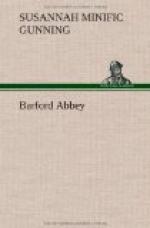Pardon my disobedience.—Can there be a stronger command than your request?—But, my Lady, I must have died,—my life must have been the sacrifice, had I gone to the Lodge.—The windows opposite, the windows of that little mansion where I spent nineteen happy years with my angelic benefactress,—could it be borne?—Your Ladyship’s absence too;—what an aggravation;—The young ladies you kindly propose for my companions, though very amiable, could not have shut my eyes, or deaden’d my other senses.
Now let me account for being at Barford Abbey.—Was Mr. Jenkings my father, I think I could not love him more; yet when he press’d me to return with him to Hampshire, I was doubtful whether to consent, till your Ladyship’s approbation of him was confirmed in so particular a manner.—His son an only one;—the fine fortune he must possess;—these were objections not only of mine, but, I believe, of my dear, dear—Oh! my Lady, I cannot yet write her name.—Often has she check’d Mr. Jenkings, when he has solicited to take me home with him:—her very looks spoke she had something to fear from such a visit.—She loved me;—the dear angel loved me with maternal affection, but her partiality never took place of noble, generous sentiments.—Young people, she has frequently said, are, by a strict intimacy, endeared to each other. This, I doubt not, was her motive for keeping me at a distance.—She well knew my poor expectations were ill suited to his large ones.—I know what was her opinion, and will steadily adhere to it.
Edmund, to do him common justice, is a desirable youth:—such a one as I can admire his good qualities, without another with than to imitate them.—Monday, the tenth, I took my leave of Hillford Down, and, after a melancholy journey, arrived Tuesday evening at Mr. Jenkings’s.—Nothing did I enjoy on the road;—in spight of my endeavours, tears stream’d from my eyes incessantly;—even the fine prospects that courted attention, pass’d unnotic’d.—My good conductor strove to draw me off from gloomy subjects, but in vain, till we came within a few miles of his house; then of a sudden I felt a serenity, which, for some time, has been a stranger to my breast;—a serenity I cannot account for.
Mrs. Jenkings!—never shall I forget her humanity. She flew to the chaise the instant it stopp’d, receiv’d me with open arms, and conducted me to the parlour, pouring out ten thousand welcomes, intermingled with fond embraces.—She is, I perceive, one of those worthy creatures, who make it a point to consider their husbands friends as their own; in my opinion, the highest mark of conjugal happiness.
Plac’d in a great chair next the fire, every one was busied in something or other for my refreshment.—One soul,—one voice,—one manner, to be seen in the father,—mother,—son:—they look not on each other but with a smile of secret satisfaction. To me their hearts speak the same expressive language;—their house,—their dress,—their words, plainly elegant.—Envy never stops at such a dwelling;—nothing there is fit for her service:—no pomp,—no grandeur,—no ostentation.—I slept sweetly the whole night;—sweetly!—not one disagreeable idea intruded on my slumbers.




